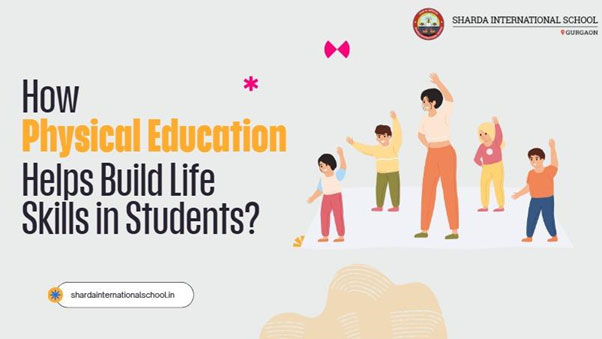How Physical Education Helps Build Life Skills in Students?
 According to UNESCO, 81% of adolescents worldwide are not
physically active enough, missing out on the myriad benefits of
physical education. It's not just about running laps or playing
games; it's about equipping students with life skills that go far
beyond the gymnasium. Physical education (PE) molds young minds,
teaching them resilience, teamwork, discipline, and so much more.
It’s like a hidden curriculum—lessons that stick for life.
According to UNESCO, 81% of adolescents worldwide are not
physically active enough, missing out on the myriad benefits of
physical education. It's not just about running laps or playing
games; it's about equipping students with life skills that go far
beyond the gymnasium. Physical education (PE) molds young minds,
teaching them resilience, teamwork, discipline, and so much more.
It’s like a hidden curriculum—lessons that stick for life.
Reason Physical Education Is Important For Students
Teamwork Makes the Dream Work
The first time a kid passes the ball in a game or strategizes with
teammates to score a goal, they’re learning something profound:
how to work together. These moments are more than just
sports—they’re lessons in collaboration and communication. When
the stakes are high, and the game’s on the line, students
understand the value of collective effort.
Studies show that students engaged in team sports during PE
demonstrate a 24% increase in interpersonal skills. Learning to
navigate disagreements, celebrate wins, and accept losses
gracefully builds the emotional intelligence that’s critical for
thriving in the real world.
Resilience: A Skill You Can’t Teach in a Classroom
"Success is not final, failure is not fatal: It is the courage to
continue that counts." This famous quote by Winston Churchill
resonates deeply in the context of physical education. On the
field, failure is inevitable—a missed shot, a fall, or a failed
attempt at a new skill. But every stumble comes with a chance to
rise stronger.
In PE classes, resilience isn’t a theoretical concept; it’s a
lived experience. Students learn to embrace challenges, cope with
setbacks, and push past their limits. It’s this grit that
translates to real-life situations—whether it’s acing a tough exam
or dealing with life’s curveballs.
The Discipline Factor
Ever noticed how a disciplined routine can make life easier?
Physical education introduces students to the power of discipline
early on. From showing up for practice to sticking to workout
plans, PE teaches kids the value of consistency.
This isn’t just about physical fitness; it’s about mental
commitment. Research highlights that students involved in regular
physical activities are 23% more likely to exhibit better time
management and organizational skills. Discipline in PE serves as a
microcosm of life, showing students that small, consistent efforts
can lead to big results.
Leadership in Action
Not every leader wears a suit; some wear sneakers. Physical
education provides ample opportunities for students to step into
leadership roles, whether it’s captaining a team or mentoring
peers in a new activity. These experiences build confidence and
teach responsibility in a way that textbooks simply can’t
replicate.
Interestingly, a study published in the Journal of Youth
Development found that 68% of students who engaged in leadership
roles during PE carried those skills into adulthood. Whether it’s
guiding a group project or managing workplace conflicts, these
foundational experiences shape future leaders.
Stress Buster and Confidence Booster
With academic pressure skyrocketing, students need an outlet to
unwind. Physical education offers exactly that. Exercise releases
endorphins—the feel-good chemicals in the brain—that help
alleviate stress. Imagine a student juggling exams and homework;
stepping onto the sports field can provide a much-needed break,
sharpening their focus and lifting their mood.
And let’s not forget the confidence boost. Every time a student
improves their sprint time, nails a basketball shot, or masters a
new yoga pose, they’re building self-esteem. PE becomes a mirror,
reflecting their growth and potential back to them.
Problem-Solving Skills in Real-Time
Life throws curveballs, and physical education trains students to
handle them with grace. Whether it's devising a strategy to
outplay opponents or adapting to unpredictable situations during a
game, PE nurtures critical thinking and quick decision-making.
For example, a simple activity like dodgeball isn’t just fun—it’s
a lesson in spatial awareness, timing, and strategic thinking.
Students learn to assess situations on the fly and act
accordingly, a skill they’ll need whether they’re managing
projects at work or navigating personal challenges.
A Sense of Community and Belonging
Loneliness among students is on the rise, but physical education
can counter that. Being part of a team or even a class activity
fosters a sense of belonging. It’s about more than just winning or
losing; it’s about creating memories, building friendships, and
feeling connected.
This sense of camaraderie often extends beyond the gym. Students
find peers they can rely on, creating bonds that stand the test of
time. PE, in its own way, helps combat social isolation and
promotes emotional well-being.
Life Lessons in Every Kick, Jump, and Stretch
Physical education is like a workshop for life. It teaches
accountability when students track their progress, respect when
they play fair, and empathy when they encourage a struggling
teammate. These aren’t just sports skills; they’re people skills.
Moreover, PE creates a safe space for students to explore their
strengths and weaknesses without judgment. They learn that it’s
okay to not be the best at everything—a realization that fosters
humility and acceptance.
At Sharda International School, we understand the profound impact
physical education can have on shaping young minds. Our approach
integrates these life lessons into every activity, ensuring
students not only stay fit but also grow as individuals. It’s not
just PE—it’s preparation for life.